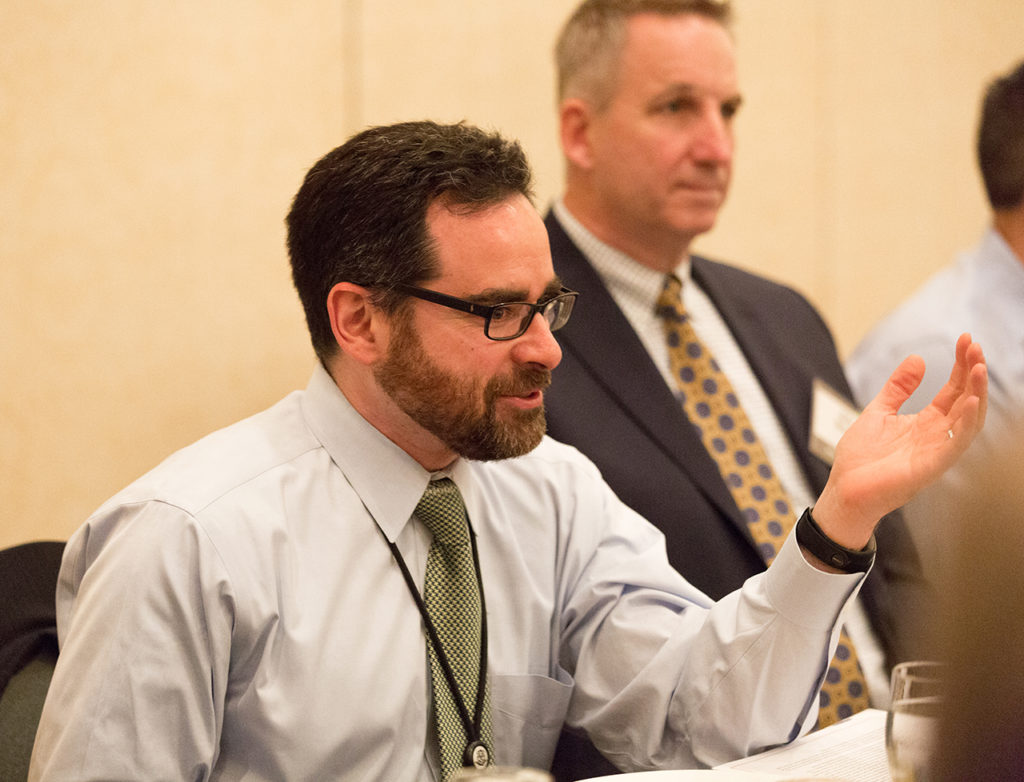CBIA Forum Brings DEEP Officials, Manufacturers Together

Department of Energy and Environmental Protection commissioner Rob Klee has been a Manufacturers Roundtable guest at CBIA’s annual Energy & Environment Conference every year since 2014.
Klee, who’ll step down when Governor Dannel Malloy leaves office early next year, said the annual hour-long gatherings with Connecticut manufacturers—from family-owned shops to large corporations—provide insight he receives nowhere else.

Insights: DEEP commissioner Rob Klee speaks with manufacturers May 18 at CBIA’s Energy & Environment Conference.
As Klee enjoyed his final roundtable May 18 with about two dozen manufacturers in Farmington, he reflected on how the meetings have helped improve his agency’s performance—and enabled it to better serve Connecticut business.
“I have been coming here for five years in a row now and really appreciate this small group,” Klee said.
“From this group, we’ve worked on specific things that have been of focus to you. It really has been a terrific forum by CBIA to make sure we’re hearing from you and working for you.”
Plant, Facility Tours
Manufacturers who Klee met at roundtable meetings regularly invite him to visit their plants and view their operations.
“I’ve learned a lot touring your facilities and hearing from your perspective what it’s like to navigate our bureaucracy—the places that are dead ends, the places that are a maze, and where it would help if there were a road map or improvements,” he said.
“It’s been a real education for me, coming from a legal and academic background, to understand what happens on the ground.”
It really has been a terrific forum by CBIA to make sure we're hearing from you and working for you.
Among them was SB 265, which establishes a new system for expediting permit applications associated with manufacturing production lines.
CBIA worked closely with DEEP on this bill to ensure its passage.
DEEP Staffing Issues
Klee was accompanied by deputy commissioner Bob Kaliszewski, who's been with DEEP for more than 30 years.
Klee said his agency has been challenged by the loss of veteran staffers, who take a wealth of knowledge with them when they retire.
"We're really managing through some attrition levels," he said.
Several manufacturers cited the frustration they have in dealing with new inspectors who don't seem to understand the nuances of a particular manufacturing process.
One said their now-retired DEEP inspector spent two to three days at their facility.
"I have a new inspector who's been on site over four days and is coming back," she said. "It's unfortunate there's no learning curve."
Kaliszewski said DEEP is trying to remedy this by cross training new hires so they can do several types of inspections.
Regulatory Concerns
Klee admitted he's hamstrung by a budget that doesn't allow him to keep retiring inspectors long enough to train their replacements.
But he said HB 5454, passed this session and supported by CBIA, could eventually help ease that situation.
It introduces a pilot program that allows DEEP to use licensed environmental professionals to assist in permit reviews.
"This is an approach that might have potential to pick up some of the slack in programs where we have been losing staff or are down to critically low levels of staff," Klee said.
As an example of an overbearing regulation, one manufacturer described how regular testing of discharge waters at his plant includes a substance that hasn’t showed up in those tests for 20 years.
He asked why he has to keep spending money to test for a substance that's clearly not there.
Similarly, a representative from a Bethel manufacturer asked why the company still has to test for mercury when it hasn't been used in their processes for years.
Klee listened intently to each concern.
"This is exactly why I like coming here," he said.
RELATED
EXPLORE BY CATEGORY
Stay Connected with CBIA News Digests
The latest news and information delivered directly to your inbox.


